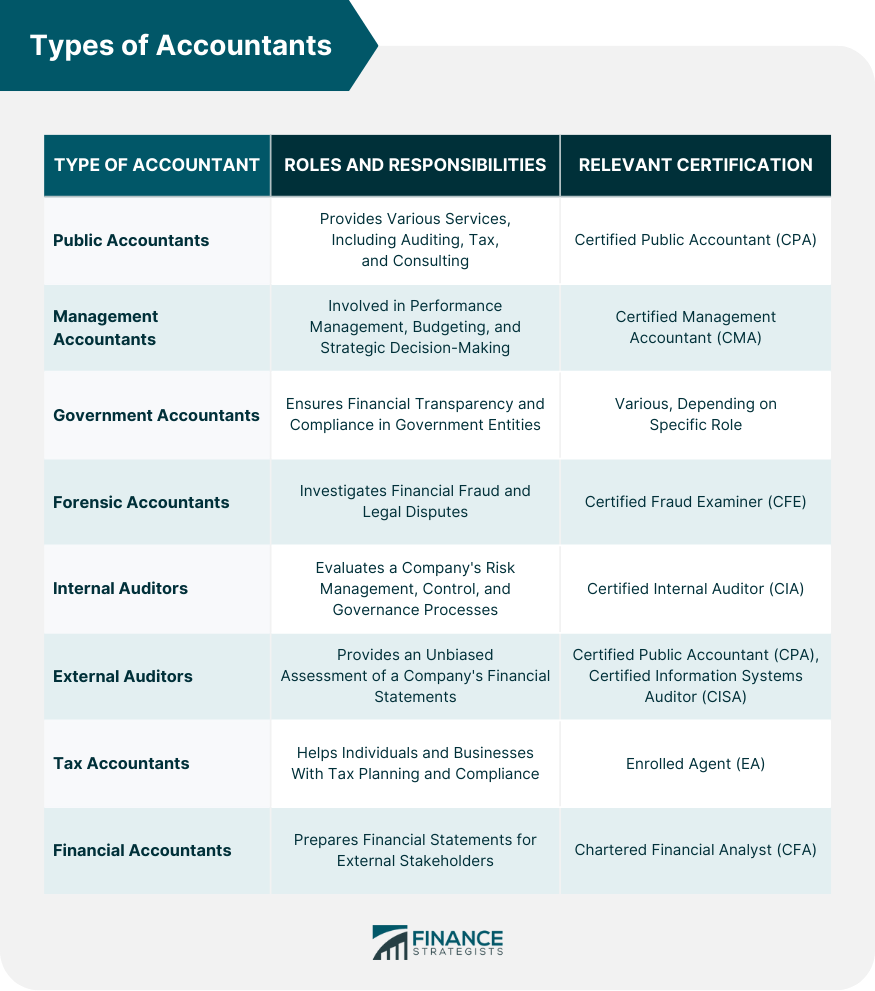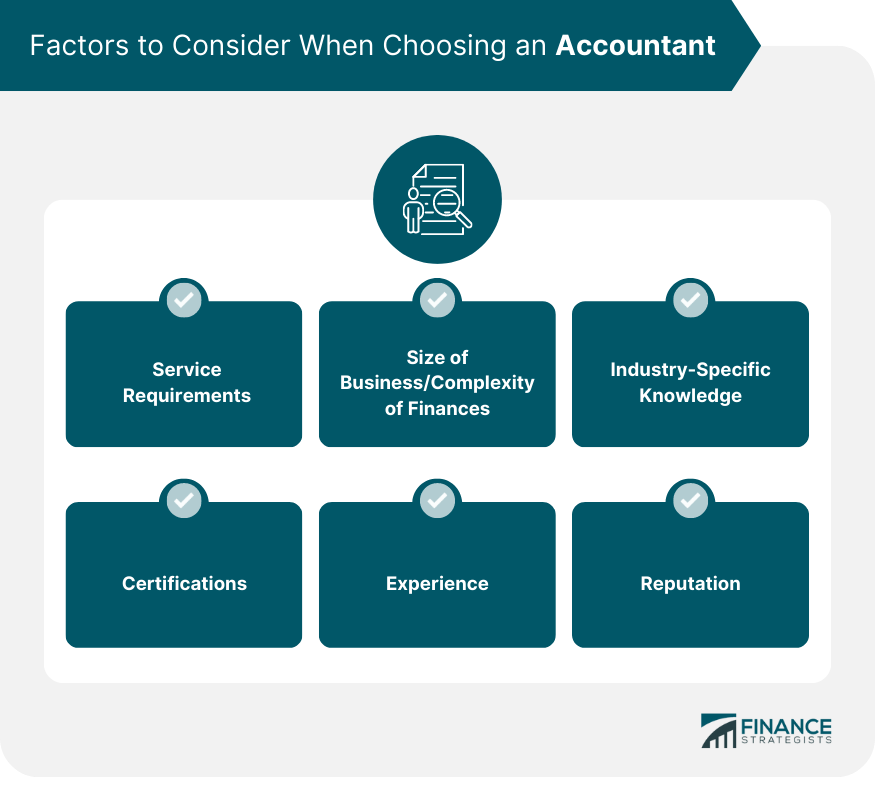An accountant is a professional who manages, analyses, and reports financial information. Their key responsibilities include preparing financial records, conducting audits, and filing taxes. Accountants ensure the financial health of an entity by inspecting financial statements for accuracy and legality. They employ a variety of skills, such as data analysis, critical thinking, and proficiency in accounting software. Their work is integral to individuals, businesses, non-profit organizations, and governmental bodies, aiding in financial decision-making and strategy. The profession requires a strong grasp of accounting principles, and accountants often hold degrees in related fields. Many obtain certification as a Certified Public Accountant (CPA), Certified Management Accountant (CMA), or other specialized designations, depending on their area of expertise. Accountants are essential for upholding financial transparency, compliance with regulations, and contributing to an organization's financial stability and growth. The accounting profession is diverse and dynamic, with various specialties catering to different financial needs. Public accounting is perhaps the broadest and most visible field in the accounting world. Public accountants work with a variety of clients, from individuals to corporations, providing services such as auditing, tax preparation, and consulting. Public accountants wear many hats. In auditing, they examine financial statements to ensure their accuracy and adherence to regulations. In tax preparation, they help clients navigate complex tax laws to minimize liability and ensure compliance. In consulting, they advise clients on various business and financial matters, such as mergers and acquisitions or financial planning. To practice public accounting at its highest level, an accountant typically becomes a Certified Public Accountant. This designation signals a high level of expertise and ethical standards. Earning a CPA license requires passing a rigorous examination, meeting specific education and experience requirements, and committing to ongoing professional education. Management accounting, also known as managerial or cost accounting, focuses on providing financial information within an organization to aid in management decisions. These accountants are essential in planning, controlling, and decision-making processes in businesses. Management accountants analyze financial data to forecast business trends and help managers make informed decisions. They may prepare internal reports, conduct cost analyses, and devise budgets. Their work is primarily forward-looking and strategic, as opposed to the historical focus of financial accounting. The Certified Management Accountant designation is the gold standard in this field. CMAs are experts in business finance and strategy, and their expertise is vital for companies looking to navigate the complex waters of global business. Government accounting, as the name implies, involves managing and auditing the financial transactions of government agencies and entities. They ensure public funds are spent correctly and efficiently and that these entities comply with laws and regulations. Government accountants work at all levels of government—local, state, and federal. Their tasks may include budgeting, expenditure tracking, and performance auditing. They play a crucial role in maintaining transparency and accountability in government operations. There's no specific certification for government accountants. However, becoming a Certified Government Financial Manager (CGFM), a program offered by the Association of Government Accountants, can enhance one's career in this field. This certification acknowledges expertise in governmental accounting, auditing, financial reporting, internal controls, and budgeting. Forensic accounting is a niche field that combines accounting skills with investigative techniques. It is commonly employed in legal proceedings and disputes to examine and interpret complex financial information. Forensic accountants often play a pivotal role in uncovering financial fraud and mismanagement. Their work includes identifying and interpreting evidence of financial irregularities, preparing reports, testifying as expert witnesses in court, and advising on strategies to prevent financial fraud. The Certified Fraud Examiner (CFE) certification is the standard for professionals in this field. Administered by the Association of Certified Fraud Examiners, the CFE designation is recognized globally and signals expertise in fraud detection and prevention. Internal auditing is an independent and objective consulting function designed to improve an organization's operations. Internal auditors work within an organization to evaluate its risk management, control, and governance processes. Internal auditors provide an ongoing assessment of a company's financial health and operational efficiency. They identify areas of risk, ensure compliance with regulations and internal procedures, and recommend improvements. Their work is vital for maintaining internal controls and corporate governance standards. The Certified Internal Auditor (CIA) certification, provided by the Institute of Internal Auditors, is the most widely recognized credential in the field of internal auditing. Earning the CIA credential signifies a high level of professionalism and commitment to the principles of internal auditing. External auditors, unlike internal auditors, operate independently of the organizations they audit. They provide an unbiased assessment of a company's financial statements and ensure they are a fair and accurate representation of the company's financial position. The primary role of an external auditor is to examine a company's financial statements and opine on their accuracy and compliance with generally accepted accounting principles (GAAP). In doing so, they provide investors, creditors, and other stakeholders with reliable information upon which to base financial decisions. Like public accountants, many external auditors are CPAs, as the CPA designation is often a requirement for conducting audits of public companies. Another relevant certification is the Certified Information Systems Auditor (CISA) designation, particularly valuable for auditors who specialize in information technology systems. Tax accounting is a specialty within the accounting field that focuses specifically on tax-related matters. It involves understanding and applying tax laws to help individuals and businesses meet their tax obligations while minimizing their tax liability. Tax accountants prepare tax returns, provide tax planning services, and ensure compliance with federal, state, and local tax laws. They stay up-to-date with changes in tax legislation, interpret tax laws and rulings, and advise clients on the tax implications of various business decisions. The Enrolled Agent (EA) certification is a nationally recognized professional credential for tax practitioners who have demonstrated competence in tax preparation. Administered by the Internal Revenue Service (IRS), it grants the right to represent taxpayers before the IRS. Financial accounting is the process of preparing financial statements that companies use to show their financial performance and position to people outside the company, including investors, creditors, suppliers, and customers. Financial accountants prepare and present financial statements in accordance with applicable standards (GAAP or IFRS). They ensure the accuracy of these statements and provide financial reporting to stakeholders. Their work forms the basis for many financial decisions within a company and among its stakeholders. Although not exclusive to accounting, the Chartered Financial Analyst (CFA) certification demonstrates a high level of expertise in financial analysis and investment management. This globally recognized certification can be beneficial for financial accountants who deal with investment analysis and portfolio management. From public and management accountants to government and forensic accountants, internal and external auditors, to tax and financial accountants, each plays a vital role in the financial landscape. Choosing the right type of accountant depends on the unique needs and circumstances of an individual or business. Service Requirements: Identify the specific services you need, such as tax preparation, financial reporting, bookkeeping, or auditing. Size of Business/Complexity of Finances: Consider the size of your business and the complexity of your financial situation. Industry-Specific Knowledge: If your business operates in a particular industry, it may require specific accounting expertise. Certifications: Look for accountants with professional certifications such as Certified CPA, CMA, or CIA. Experience: The accountant's experience in the field can reflect their capability and expertise. Reputation: An accountant's reputation can provide insights into their work ethic, reliability, and effectiveness in managing finances. Accountants play a vital role in managing and reporting financial information across various sectors. The accounting profession encompasses different types of accountants, each with their unique roles and responsibilities. Public accountants provide services such as auditing, tax preparation, and consulting to a diverse range of clients. Management accountants focus on financial information within organizations to aid in decision-making processes. Government accountants ensure transparency and compliance in government entities. Forensic accountants specialize in investigating financial fraud and disputes. Internal auditors evaluate an organization's risk management and governance processes. External auditors provide independent assessments of financial statements. Tax accountants handle tax-related matters for individuals and businesses. Financial accountants prepare financial statements for external stakeholders. When choosing an accountant, consider factors such as service requirements, the size and complexity of finances, industry-specific knowledge, certifications, experience, and reputation. By selecting the right accountant, individuals and businesses can effectively manage their finances, ensure compliance, and make informed financial decisions.Overview of the Role of an Accountant
Public Accountants
Definition and Scope of Public Accounting
Typical Responsibilities and Roles
Certification: Certified Public Accountant (CPA)
Management Accountants
Definition and Scope of Management Accounting
Typical Responsibilities and Roles
Certification: Certified Management Accountant (CMA)
Government Accountants
Definition and Scope of Government Accounting
Typical Responsibilities and Roles
Certifications Relevant to Government Accounting
Forensic Accountants
Definition and Scope of Forensic Accounting
Typical Responsibilities and Roles
Certification: Certified Fraud Examiner (CFE)
Internal Auditors
Definition and Scope of Internal Auditing
Typical Responsibilities and Roles
Certification: Certified Internal Auditor (CIA)
External Auditors
Definition and Scope of External Auditing
Typical Responsibilities and Roles
Certifications Relevant to External Auditing
Tax Accountants
Definition and Scope of Tax Accounting
Typical Responsibilities and Roles
Certification: Enrolled Agent (EA)
Financial Accountants
Definition and Scope of Financial Accounting
Typical Responsibilities and Roles
Certification: Chartered Financial Analyst (CFA)
Summary Table of the Types of Accountants

Choosing the Right Type of Accountant
Factors to Consider When Choosing an Accountant

Bottom Line
Types of Accountants FAQs
There are several types of accountants including public, management, government, forensic, internal and external auditors, tax, and financial accountants.
A public accountant provides a variety of services, including auditing, tax preparation, and consulting to a range of clients, from individuals to corporations.
Internal auditors work within an organization to assess its risk management and governance processes, while external auditors operate independently, providing an unbiased assessment of a company's financial statements.
A forensic accountant combines accounting skills with investigative techniques, often employed in legal proceedings and disputes, to examine and interpret complex financial information.
Choosing the right accountant depends on your unique needs and circumstances, including the nature of the services needed, the size and industry of your business, and the complexity of your financial situation.
True Tamplin is a published author, public speaker, CEO of UpDigital, and founder of Finance Strategists.
True is a Certified Educator in Personal Finance (CEPF®), author of The Handy Financial Ratios Guide, a member of the Society for Advancing Business Editing and Writing, contributes to his financial education site, Finance Strategists, and has spoken to various financial communities such as the CFA Institute, as well as university students like his Alma mater, Biola University, where he received a bachelor of science in business and data analytics.
To learn more about True, visit his personal website or view his author profiles on Amazon, Nasdaq and Forbes.











